#106: Dr Crocker: Intentional Career Moves, Mastering Change Without Fear, And The Pros Of Vulnerability and Virality.

Have you ever found yourself in a moment in your career where you knew: ‘This is definitely not it. Something has to change!’
Dr Tannetje Crocker’s career is as multifaceted as a diamond, and just as brilliant, and in this episode she’ll show us that if you approach your career with intention and heart that the grass CAN be greener. This episode of the Vet Vault is for every veterinarian who's ever felt the tug of 'what if’. Dr. Crocker's story is a masterclass in crafting a veterinary life you love, and in this conversation we unpack pivotal career decisions, learn about cultivating confidence, resilience, and optimism in the field of veterinary medicine while fiercely advocating for self-care and vulnerability, the intricacies of balancing family life with multiple roles, and we get a peek into Tannetje’s social media career.
Dr Tannetje Crocker is a speaker, social media personality and a practicing ER veterinarian for Veterinary Emergency Group in Dallas, TX, as well as the practice owner of Alta Vista Animal Hospital in Fort Worth, TX who finds her joy in supporting her fellow veterinary professionals, both virtually and in person, through her various endeavours.
Topic List:
10:28 Why Tannetje's content resonates with so many people.
11:37 Doing things that scare you often leads to good opportunities.
17:34 Is the grass sometimes a little greener on the other side?
24:04 Dr Crocker’s different hats.
27:40 Doing things out of love.
30:25 Learning to escape the tall poppy syndrome.
32:55 The fear associated with change.
34:56 Working in an Open Concept Veterinary Hospital.
37:10 Work life integration rather than work life balance.
42:45 What would Dr Crocker do if she wasn’t a vet?
44:53 Dr Crocker’s most popular social posts/podcasts.
50:04 Why does Dr Crocker keep her social presence positive?
52:50 Self care and vulnerability.
58:27 What would be the title of the movie of Tannetje’s life?
Tannetje's resources:
Podcast - Six Minutes
Podcast - Terrible Thanks For Asking
Podcast - The Derm Vet
Podcast - The Cone of Shame
Conference - Unchartered Veterinary Conference
Join our community of Vet Vault Nerds to lift your clinical game and get your groove back with our up-to-date, easy-to-consume clinical episodes at vvn.supercast.com.
Visit thevetvault.com for show notes and resources related to this episode.
Connect with us through our online Vet Vault Network for episode highlights, clinical resources, discussions, questions and support.
Subscribe to our weekly newsletter here for Hubert's favourite clinical and non-clinical learnings.






